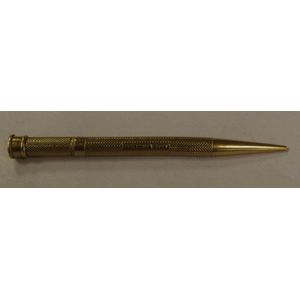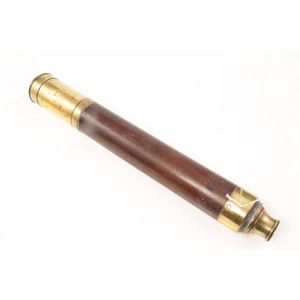Art Nouveau Absinthe Bottle with Silver and Glass
An Art Nouveau glass and .950 silver Absinthe bottle, late 19th century France, with Minerva 1 standard and maker's mark CV in cartouche, the clear baluster bottle cut to resemble a fine beaten finish with a plain removable flask to the base and a cushion form globular pull off top of similar design; hallmarked to upper section and base of flask, neck mount and lid. Height 12 cm
You must be a subscriber, and be logged in to view price and dealer details.
Subscribe Now to view actual auction price for this item
When you subscribe, you have the option of setting the currency in which to display prices to $Au, $US, $NZ or Stg.
This item has been sold, and the description, image and price are for reference purposes only.
- Art Nouveau Period - The Art Nouveau period was a cultural movement that emerged in the late 19th century, and was characterized by its emphasis on natural forms, flowing lines, and a decorative, ornamental style. Art Nouveau was a reaction against the ornate and heavily stylized designs of the previous era, and sought to create a new, more organic aesthetic.
Art Nouveau was characterized by its use of sinuous, curving lines, as well as a focus on natural elements such as flowers, vines, and other organic shapes. Art Nouveau designers sought to create a total work of art, in which every element of a building or object was designed to be harmonious with the overall design.
Some of the most iconic examples of Art Nouveau design include the Paris Metro entrances designed by Hector Guimard, the works of the artist Alphonse Mucha, and the architecture of Victor Horta in Brussels.
The Art Nouveau period was at its peak between 1890 and 1910, but began to decline in popularity by the start of World War I. However, Art Nouveau remains an important influence on design and art to this day, and continues to be celebrated for its emphasis on natural forms and decorative style. - Hallmarks - A mark stamped on articles of precious metals in Britain, since the 14th century, certifying their purity. It derives its name from the Guild Hall of the Goldsmiths' Company, who recieved its Charter in 1327 giving it the power to assay (test the purity) and mark articles of gold and silver.
The hallmark will consist of several marks, including the:
- silver standard mark, indicating the purity of the metal. Sterling silver is .925 pure silver.
- the city mark indicating the city in which it was assayed eg London, Birmingham, York etc.
- the date mark, usually a letter of the alphabet in a particular font and case,
- a duty mark, indicating whether duty had been paid to the crown, and only in use from 1784 to 1890
The piece may include an additional mark, the maker's mark, although not forming part of the hallmark, will be located in the vicinity of the hallmarks.
Sometimes silver plated items will bear faux hallmarks, often confusing those not familiar with silver markings. - Cartouche - An ornamental panel in the form of of a shield, oval or rectangular scroll with curling edges. It may be carved into the back of a chair or the top of a sideboard, or present on a piece of silver or jewellery, and contain the initials of the original owner, heraldic symbols, or some other inscription, such as the details of a presentation.
In ceramics the term defines the central area of a vase or similar with a decorative border in one of the shapes above, into which a decorative scene or figures have been painted.
This item has been included into following indexes:
Visually similar items

Silver hallmarked cheroot holder Birmingham 1913
Sold by
in
for
You can display prices in $Au, $US, $NZ or Stg.

Vintage silver plate and ebony walking stick
Sold by
in
for
You can display prices in $Au, $US, $NZ or Stg.

9ct gold Mordan mechanical pencil, hallmarked London
Sold by
in
for
You can display prices in $Au, $US, $NZ or Stg.

A 19th century Hemsley telescope with brass and mahogany body, signed, age related wear. Length 50 cm
Sold by
in
for
You can display prices in $Au, $US, $NZ or Stg.
